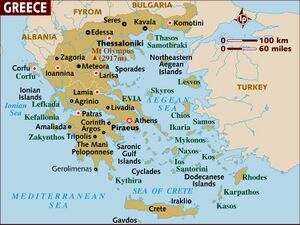Thessaloniki
| Author: Laxman Burdak, IFS (R). |

Thessaloniki is the second-largest city in Greece. It is mentioned by Pliny as Thessalonica. [1]
Variants
- Thessaloniki (/ˌθɛsələˈniːki/; Greek: Θεσσαλονίκη, [θesaloˈnici]
- Thessalonica (English: /ˌθɛsələˈnaɪkə, ˌθɛsəˈlɒnɪkə/)
- Saloniki
- Salonica (/səˈlɒnɪkə, ˌsæləˈniːkə/)
- Thessaloníkē (Θεσσαλονίκη)
- Thettaloníkē
- Saloníki (Σαλονίκη)
- Salunik
- Salonika
- Thessalonika
- Thessalonike
- Thessalonice
- Thessalonica (Pliny.vi.39)
Jat Gotras Namesake
Names and etymology
The original name of the city was Θεσσαλονίκη Thessaloníkē. It was named after the princess Thessalonike of Macedon, the half sister of Alexander the Great, whose name means "Thessalian victory", from Θεσσαλός Thessalos, and Νίκη 'victory' (Nike), honoring the Macedonian victory at the Battle of Crocus Field (353/352 BC).
Minor variants are also found, including Θετταλονίκη Thettaloníkē,[2][3] Θεσσαλονίκεια Thessaloníkeia,[4] Θεσσαλονείκη Thessaloníkē, and Θεσσαλονικέων Thessalonikéon.[5][6]
The name Σαλονίκη Saloníki is first attested in Greek in the Chronicle of the Morea (14th century), and is common in folk songs, but it must have originated earlier, as al-Idrisi called it Salunik already in the 12th century. It is the basis for the city's name in other languages: Солѹнъ (Solunŭ) in Old Church Slavonic, סאלוניקו[7][8] (Saloniko) in Judeo-Spanish (שאלוניקי prior to the 19th century[9] ) סלוניקי (Saloniki) in Hebrew, (Selenik) in Albanian language, سلانیك (Selânik) in Ottoman Turkish and Selânik in modern Turkish, Salonicco in Italian, Solun or Солун in the local and neighboring South Slavic languages, Салоники (Saloníki) in Russian, Sãrunã in Aromanian[10] and Săruna in Megleno-Romanian.[11]
In English, the city can be called Thessaloniki, Salonika, Thessalonica, Salonica, Thessalonika, Saloniki, Thessalonike, or Thessalonice. In printed texts, the most common name and spelling until the early 20th century was Thessalonica; through most of rest of the 20th century, it was Salonika. By about 1985, the most common single name became Thessaloniki. The forms with the Latin ending -a taken together remain more common than those with the phonetic Greek ending -i and much more common than the ancient transliteration -e.[12]
History
The city was founded in 315 BC by Cassander of Macedon, who named it after his wife Thessalonike, daughter of Philip II of Macedon and sister of Alexander the Great. An important metropolis by the Roman period, Thessaloniki was the second largest and wealthiest city of the Byzantine Empire. It was conquered by the Ottomans in 1430 and remained an important seaport and multi-ethnic metropolis during the nearly five centuries of Turkish rule. It passed from the Ottoman Empire to the Kingdom of Greece on 8 November 1912. Thessaloniki exhibits Byzantine architecture, including numerous Paleochristian and Byzantine monuments, a World Heritage Site, as well as several Roman, Ottoman and Sephardic Jewish structures. The city's main university, Aristotle University, is the largest in Greece and the Balkans.[13]
Tourism
Thessaloniki is a popular tourist destination in Greece. In 2013, National Geographic Magazine included Thessaloniki in its top tourist destinations worldwide,[14] while in 2014 Financial Times FDI magazine (Foreign Direct Investments) declared Thessaloniki as the best mid-sized European city of the future for human capital and lifestyle.[15]
References
- ↑ Pliny.vi.39
- ↑ Inscriptiones Graecae, X 2. 1 Thessalonica et vicinia, p. 19
- ↑ Πολυβίου Ιστοριών τα σωζόμενα, Editore Ambrosio Firmin Didot, Parisiis, MDCCCXXXIX σελ. 679
- ↑ Strabo. "7". Geographica. Vol. 7.
- ↑ Inscriptiones Graecae, Χ 2.1 Thessalonica et vicinia - 19, 24, 150, 162, 165, 167, 177-179, 181, 199, 200, 207, 231-233, 283, 838, 1021, 1026, 1028, 1031, 1034, 1035
- ↑ Ioannis Touratsoglou (1988). Die Münzstätte von Thessaloniki in der römischen Kaiserzeit (in German). Berlin. pp. 115–16.
- ↑ "Cover". Digital collections. U. Washington. Retrieved 8 March 2022.
- ↑ "Details - Kima". geo-kima.org.
- ↑ "Details - Kima". geo-kima.org.
- ↑ Α.Ι. Θαβώρης (Antonios Thavoris), "Θεσσαλονίκη - Σαλονίκη. Η ιστορία του ονόματος της πόλης" (Thessaloniki-Saloniki: The history of the name of the city), "Η Θεσσαλονίκη" (Thessaloniki), Κέντρο Ιστορίας Θεσσαλονίκης (Center for the History of Thessaloniki), Δήμος Θεσσαλονίκης (City of Thessaloniki), 1985, p. 5-21.
- ↑ MEGLENOROMÂNII–ASPECTE ISTORICE, GEOGRAFICE, ETNOIDENTITARE ȘI ETNODEMOGRAFICE. p. 328.
- ↑ "Google nGrams".
- ↑ "ARISTOTLE UNIVERSITY OF THESSALONIKI". www.auth.gr.
- ↑ "Best Trips 2013 – Thessaloniki". National Geographic.
- ↑ "Η Θεσσαλονίκη αναδείχθηκε σε ευρωπαϊκή πόλη του μέλλοντος για το 2014 | ΕΛΛΑΔΑ | ΕΙΔΗΣΕΙΣ | LiFO". lifo.gr. 17 February 2014; "European Cities and Regions of the Future 2014/15" (PDF). 17 February 2014. Archived (PDF) from the original on 9 October 2022.